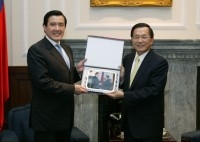President Chen Meets with Kuomintang Chairman Ma Ying-jeou

On April 3, President Chen Shui-bian met with Kuomintang (KMT) Chairman and Taipei Mayor Ma Ying-jeou at the Office of the President to exchange their opinions on cross-strait relations, constitutional reform, and the pending arms procurement bill.
The president welcomed Chairman Ma by praising Ma's resolute opposition to China's passage of the "Anti-Separation Law" and by telling him that "even though our parties may not see eye to eye on everything, we should be united in dealing with cross-strait affairs; therefore, we should not be enemies to each other, but rather our adversary is the party on the other side of the Taiwan Strait."
"1992 Hong Kong Talks" and "1992 Consensus"
Instead of beating around the bush, the president and the KMT chairman immediately laid cross-strait issues on the table. "The '1992 Consensus' does not exist," the president said, referring to the comments of former president Lee Teng-hui, former chairman of the Straits Exchange Foundation Koo Chen-fu, and Shi Hwei-yow, the foundation's former secretary-general and Taiwan's main negotiator at the 1992 Hong Kong Talks with China. The president told Ma that Koo had mentioned that the term "1992 Consensus" was coined by Su Chi, a KMT member and former chairman of the Mainland Affairs Council, and therefore would be truly problematic if a non-existent agreement were used as the foundation for cross-strait talks.
Commenting on China's and the KMT's adherence to the non-existing "1992 Consensus," the president said that for China, the "1992 Consensus" refers to the "One China Principle," which is completely incongruent with the KMT's perception that the "1992 Consensus" designates "One China with respective interpretations by the two sides," which, according to the president, further confirms that the "1992 Consensus" does not exist.
"However," the president added, "it is undoubtedly true that the '1992 Hong Kong Talks' and the process of negotiation did take place." To deal with the cross-strait impasse more constructively and practically, the president thus said, "Hence, I try to suggest we [the both sides of the Taiwan Strait] reopen dialogues and negotiations on the basis of the results reached at the 1992 Hong Kong Talks."
"Five Noes" and Framework for Cross-strait Peace and Stabilization
Ma did not forget the president's premise for the "Five Noes": China does not use force against Taiwan. Therefore, the president asked Ma, "To respond to China's intention and preparations to attack Taiwan with force, can we play blind and deaf, pretending we see nothing and hear nothing?"
The president further elaborated his promise to maintain the cross-strait status quo, in order to preserve Taiwan's democracy, its people's liberties and human rights, and cross-strait peace and stability. Hence, "If the status quo means the five noes," it is imperative that "Taiwan should not be downgraded, not be treated as a local government, not be de-governmentalized," and that "there is no such thing as the 'One China Principle."
Therefore, the president emphasized again to Ma that China's "One China Principle" means one China with two systems and peaceful unification, and is neither the same as the "One China Policy" of the United States nor in any agreement with Ma's "One China with respective interpretations by the sides."
To respond to Ma's suggestion that both sides of the Taiwan Strait could sign an agreement for peace for 30-50 years, which implies a co-existence of the Republic of China and the People's Republic of China, the president argued that China would not agree with the idea because of its One China Principle. "Even US former president Bill Clinton told me that he did not agree with the naive idea of signing a cross-strait interim agreement proposed by his staff member, Professor Kenneth Lieberthal," said the president.
Constitutional Reform
The president told Ma that to cease the function of the National Unification Council and the application of its Guidelines means to return to the people the right to make the ultimate decisions. "As is the issue of our constitutional reform," said the president, adding that any constitutional amendments proposed by the legislature must be finally decided by a referendum. "Our constitutional re-engineering will be accomplished when the social conditions are ripe, that is, a consensus reached between the ruling and opposition parties, approval from the legislature and our people showing their support through referendum."
Arms Procurement
While Ma attributed the delay of the handling of the arms procurement bill to the ceasing of the function of the National Unification Council (NUC) and its Guidelines' application, the president emphasized that those bills had long been boycotted by the opposition parties even before the decision regarding the issue of the NUC was considered. "The arms procurement policy was made when the Kuomintang was in power," the president said, "and I was actually the one who continued to execute the KMT's policy." The president expressed his hope that Ma could make it clear what he meant by "reasonable" arms procurement. "Please do not hold the NUC issue responsible for the delay," the president told Ma.
Toward the end of their discussion, the president spoke of the constructive nature of this meeting. "We can meet with each other any time again, irregardless of your position as Taipei Mayor or Kuomintang Chairman," said the president. "There is only one Taiwan and it is communally shared by its 23 million people."